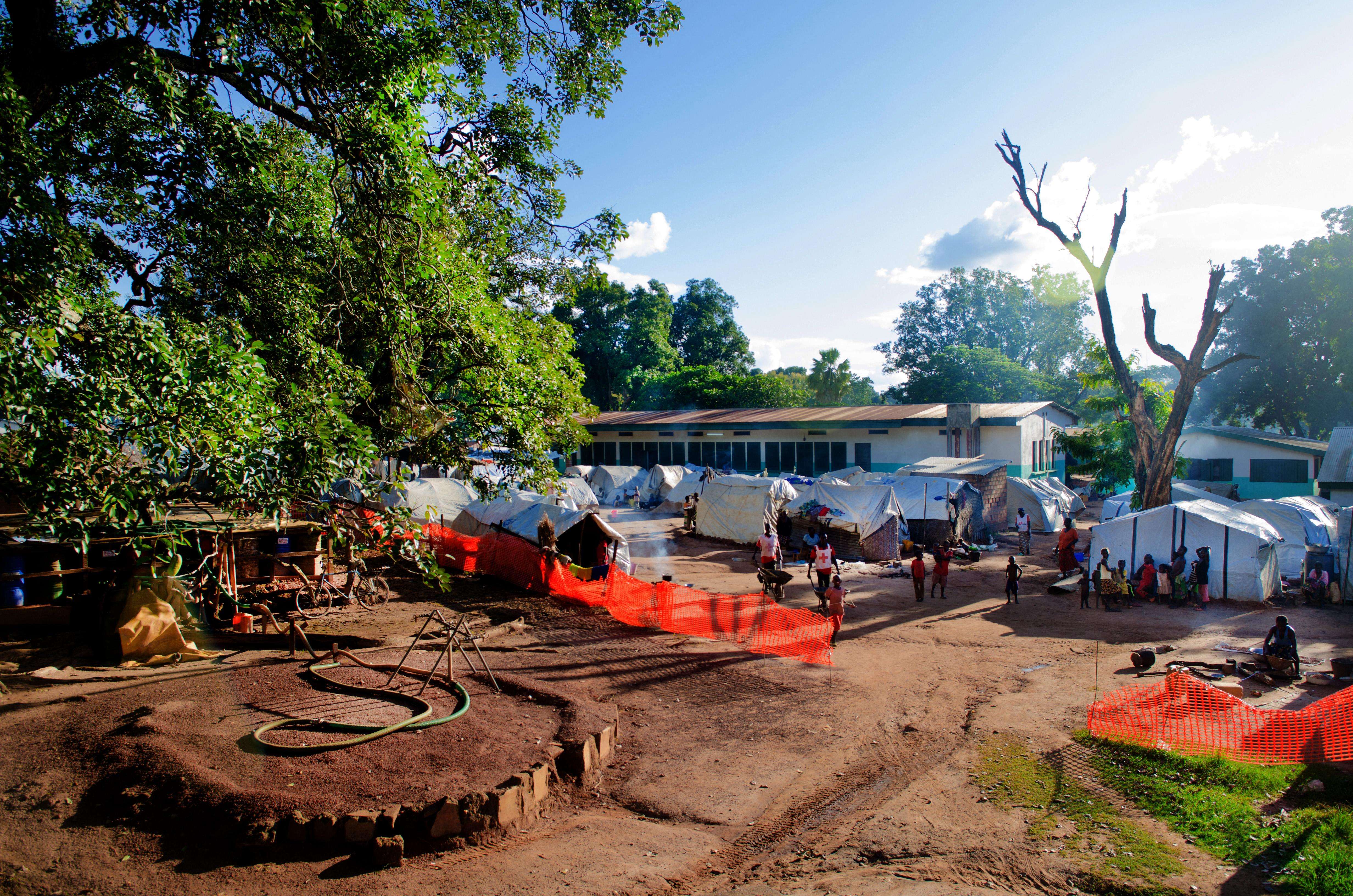Since late July 2017, fighting between ex-Seleka and Anti-balaka factions has once again set the town of Batangafo and its surroundings on fire. The conflict in the area, in northern Central African Republic (CAR), has forced tens of thousands of people to abandon the temporary shelters where they had been seeking refuge since the previous crisis in 2013 and 2014. Many have found refuge in a hospital compound supported by Doctors Without Borders/Médecins Sans Frontières (MSF).
"I’m tired of running," says 30-year-old Esther. "As long as I can hear the crackle of gunfire I will stay in the hospital." She lives in a hut built from branches and scraps of other material with her daughter and younger brother. The hut is behind the building where doctors perform operations at Batangafo Hospital. She moved there on July 29 this year, along with close to 16,000 others, when fighting broke out in Batangafo between factions of the former Seleka coalition and the Anti-balaka faction.
The "events," as the violence that ravaged the country in 2013 and 2014 is known here, are still present in people’s minds. Not everyone who fled Batangafo in 2013 returned, and 23,000 people still live on the hill in sites for displaced people. It is in these sites that fighting has again broken out. Those who had already lost everything saw their huts burned to the ground, forcing tens of thousands to flee once again.
Forced to Flee
"I don’t know why they fight," says Esther. "Any reason seems to be enough to start fighting again, to take the opportunity to loot everything. In the fighting in July some of my relatives were killed and all my belongings were destroyed or stolen." In 2014 she fled to a site for displaced people. In spite of the ceasefire agreement signed that year—which was more or less respected by the two main parties to the conflict—she didn’t return to her neighborhood for fear of being robbed or beaten by the armed men who never left Batangafo.
Today she is at the hospital with thousands of others, all of them hoping that the medical facility will provide some modicum of security. The number of displaced people there varies according to the tenor of the conflict: people try to return to their homes, only to return at the sound of gunfire. They are afraid for their lives, the only thing they have left.
The violence continued in the town in August and September of this year, until the ex-Seleka and Anti-Balaka signed a new ceasefire agreement. Since October a new “self-defense” group has sprung up, founded in a village not far from Batangafo. It is there that fighting is now taking place, beyond the river that separates the town from the neighboring community, Saragba. Newly displaced people arrived at the hospital with nothing, describing villages burned to the ground and bodies left unburied.
An Impossible Choice
"My mother stayed in the displaced people’s site," says Esther. "She told me that it was better if we separated, because if something happened to one of us then the other would still be there to look after the family. The rainy season was hard; the tarps we used didn’t keep the rain out. We spent many nights standing, squeezed against each other. The dry season returned and we are still here. There is nothing to do. Before, I was trading a little. But it’s been a long time since the money ran out."
There is little to celebrate when considering what the future might look like for Batangafo. Esther hopes that peace will return so that she can start earning money to take care of her family and send her daughter to school. But she only half believes that it will really happen. "To have peace, there must be no armed men," she says, staring at the ground.
MSF has supported the hospital in Batangafo since 2006, providing free health care to the population in the town and its surrounding areas. The organization has also put in place networks of community workers on the five roads out of the town to provide treatment for malaria and diarrhea close to the population. On the Ouogo road, where fighting is currently taking place, only two workers out of 16 managed to reach the hospital to restock their supply of medicine.
The insecurity is also preventing the MSF team from accessing the area. The population living on this road have fled to the bush or to the field with no access to health care, while the health posts in the villages have been looted, destroyed, or abandoned by medical staff who were forced to flee with their neighbors.
MSF has worked in CAR since 1997 and today provides medical aid to populations in Bria, Bambari, Alindao, Batangafo, Kabo, Bossangoa, Boguila, Paoua, Carnot, Zemio, and Bangui. In 2016, the organization provided one million medical consultations, vaccinated 500,000 children against various diseases, performed 9,000 surgical operations, and assisted in the delivery of 21,000 babies in the country. Since the beginning of the year, with the intensification in the armed conflict, MSF has had to adapt four of its 16 projects in order to respond to the urgent needs of those directly affected by the conflict.




